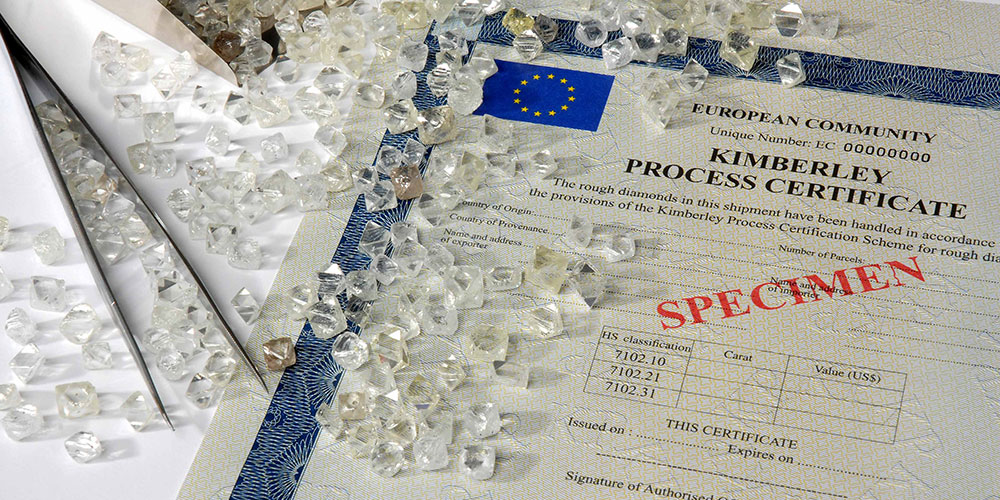Russia’s Ministry of Finance said the decision to establish a separate subgroup under the Kimberley Process (KP) on digitalisation of rough diamonds certificates was taken following the virtual Intersessional meeting of working bodies held from 21st-25th June, 2021.
Alexey Vladimirovich Moiseev, the 2021 KP Chair and Deputy Finance Minister of Russia, said, “I wish to point out the significant interest of the participants in the discussion, as proposed by Russia, on the issue of digitalisation of KP certificates which accompany each rough diamond export-import operation. Detailed deliberations on this topic allowed the KP participants to exchange current developments in this area and best practices, examine Russian proposals on establishing bilateral cooperation with a number of key partners in the diamond trade.”
The key themes of the discussion at the working sessions of the KP were the initiatives of the Russian Chairmanship, which are important for the sustainable development of the global diamond industry. These include the issues of digitalisation of KP Certificates, development of principles for responsible diamond sourcing, discussion of the “conflict diamonds” definition, selection of the location for the future KP Secretariat and expansion of KP membership.
The KP Participants and Observers considered the draft document focused on support of best practices in industry self-regulation, the so-called “Principles for Responsible Diamond Sourcing” – joint proposal of the two largest diamond producers in the world – Russia and Botswana. Positive advances were made towards the convergence of positions and approaches on this issue and further work will continue in preparation of the KP Plenary session.
Traditionally, the discussions on forging a consensus on the new “conflict diamonds” definition were not easy. Russia was guided by the need to support progress achieved by the KP Participants in 2019, the statement read. The issue of revising the “conflict diamonds” definition has acquired new relevance in the context of providing support to the diamond industry after the Covid-19 pandemic. In the post-pandemic reality, consumers prefer the goods with a guarantee of its non-conflict and ethical origin and traceability throughout the entire supply chain from mining to retail. The KP has to uptake these new trends, it added.
During a special Plenary session, KP Participants and Observers also heard the presentations of Austria, Botswana and China bidding to host a KP Permanent Secretariat that is yet to be established. Following the discussions, Russia called for a further search for consensus on this issue.
The current challenges of expansion of the KP membership due to the impossibility of conducting expert missions amid the ongoing pandemic were also discussed during the Intersessional meeting. A number of important decisions were made towards further support of the efforts of the potential candidates — Qatar, Kyrgyz Republic, Mozambique and Uzbekistan — to join the KP.
The agenda on the Central African Republic (CAR) was traditionally complicated. KP carried out productive work to assess the situation in this country in accordance with the minimum requirements of the Kimberley Process Certification Scheme (KPCS). The next important step is the organisation of the KP expert, subject to existing international travel restrictions, to assess the procedures for state control over diamond mining to prevent conflict diamonds from entering the global supply chain.
Also during the Intersessional meeting the Special Forum on Responsible Diamond Sourcing, moderated by Stéphane Fischler, Member of the Board of Trustees, RESOLVE took place after the round of traditional speeches made by heads of the KP working bodies, the leaders of the World Diamond Council and the Civil Society Coalition. At the Forum addresses were made by the Director General of the UN Office in Geneva Tatiana Valovaya, African Union Commissioner for Political Affairs Bankole Adeoye, heads and representatives of several other international organisations – the Intergovernmental Forum on Mining, Minerals, Metals and Sustainable Development, the Organisation for Economic Cooperation and Development, the International Labor Organisation, the International Organization for Standardization.
The Intersessional meeting was attended by a record number of delegations. The virtual format of the meeting allowed to demonstrate its effectiveness, increased inclusivity of the KP participants and should provide a useful experience for holding the Plenary meeting in a hybrid (virtual/face-to-face) format, the ministry noted.
The Russian Federation will continue to advance the priorities of its Chairmanship in the KP as part of the preparations for the KP Plenary meeting, which will be held on 8th-12th November, 2021, in Moscow.

